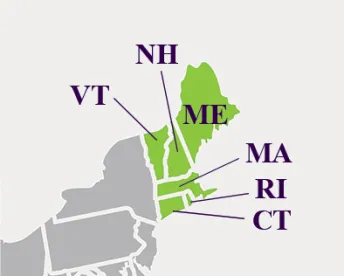New England states continue their shift away from phased reopening plans in favor of sector-specific guidance and broad capacity and gathering restrictions, although many are now easing or being removed entirely. A quick reference chart on key elements across New England, including any remaining travel restrictions, is available here. All New England states have now removed remote work requirements, although remote work is still encouraged.
In addition, some states have noted that they will be ending their states of emergency. We will be issuing a separate alert on the impact of this aspect of the return to business as usual.
Please note that all states are now vaccinating residents ages 16 and over with all vaccines, and residents over the age of 12 with the Pfizer vaccine. Many states have revised or removed their requirements for face coverings outdoors or for vaccinated persons indoors, although business and localities may be allowed to require their use.
Please also note that despite these changes, the CDC requires all passengers and operators to wear face coverings while using all methods of public transportation, with limited exemptions, including while waiting, boarding, and traveling on planes, trains, subways, buses, taxis, and other public modes of transportation. The executive order requiring face coverings to be worn in all federal buildings is also still in effect. Violators can face both civil and criminal penalties, although the CDC has said it intends to rely primarily on civil enforcement mechanisms and denial of service (for example, those who do not wear masks will not be allowed on public transportation). These penalties can be enforced by state and local authorities as well as federal.
CONNECTICUT
Effective May 19, Governor Lamont lifted all business sector rules previously enacted to prevent the spread of COVID-19 other than the state’s updated mask requirements. The state’s Department of Public Health is expected to issue new guidance for large gatherings, including stadiums and theaters, which we will update here.
Effective May 18, Connecticut now only requires face coverings to be worn indoors by those who are unvaccinated and cannot maintain social distance of six feet from other unvaccinated persons, except while eating or drinking. Exceptions still apply for those under the age of two, and for people who cannot wear masks due to medical conditions. Masks are still required for all people, regardless of vaccination status, in certain circumstances, like in health care facilities, schools, and other congregate facilities. As with many other states, Connecticut still allows businesses and localities to maintain their own mask rules. More information is available here.
The enforcement provision of Order 9B is still in place. This order authorizes local officials, including state and municipal police officers and public safety departments of higher education institutions, to issue a $100 fine for violations of the mask requirements.
Connecticut’s state of emergency is currently in effect through July 20, 2021. We note that in addition to the renewed state of emergency, Governor Lamont declared a new state of emergency to eliminate any confusion about the extent of his emergency powers, which will run concurrently with the renewed state of emergency.
MAINE
Effective May 13, Order 38 amends indoor gatherings and in-store customer limits as follows:
-
Through May 23: 50% of permitted occupancy, five people per 1,000 sq. ft., or 50 persons – whichever is greater
-
May 24: 100% of permitted occupancy
Limits on outdoor gatherings remain at up to 75% of capacity, and will also increase to 100% of capacity on May 24.
Also effective May 24, Maine will align its face covering requirements with new CDC guidance. On that date, fully vaccinated people will not be required to wear face coverings indoors, although it is recommended that those who are not fully vaccinated wear face coverings in indoor public settings. Maine will also lift the physical distancing requirement at indoor public settings where people are eating or drinking and therefore would be removing their face covering, such as indoor restaurants, bars, and other dining areas. We note that the CDC still requires face coverings on all forms of public transportation, including planes, buses, and trains.
Until that date, masks are still required indoors and recommended outdoors when six feet of physical distance is difficult to maintain, and physical distancing requirements are still in place. The following guidance, subject to the capacity changes listed above, is also in effect:
-
Offices: subject to general guidance, persons in shared space are subject to limits for indoor gatherings or less to maintain six feet of physical distance; telework encouraged
-
Restaurants: capacity includes front-of-house staff; music and entertainment allowed in certain circumstances; tables must be spaced six feet apart
-
Religious gatherings: subject to indoor business and outdoor gathering capacity limits; staff and singers required to wear masks indoors; recommended outdoors for all where distance cannot be maintained
-
Gyms and fitness: subject to indoor business and outdoor gathering capacity limits; staff required to wear masks indoors, even where distanced
-
Retail: staff required to wear masks indoors
Bars and tasting rooms are also open, subject to restaurant guidance. Guidance for performing arts venues has been revised to allow singing, provided certain health protocols are followed. More information on the Moving Maine Forward plan is available here.
Guidance is also available for the following sectors: museums, construction, golf, gyms and fitness, hotels, and personal services, including hair and nail salons, tanning, and spa/close-contact services. A list of essential businesses is available here. Sector-specific guidance states that employees should be screened for COVID-19 symptoms and exposure risk; certain sectors, such as gyms and fitness facilities, expand the screening questions to visitors and customers as well. Owners and operators of all indoor public settings, regardless of the type or size, are required to enforce the face covering requirement and must deny entry to those who refuse to comply.
Participation in community sports is allowed based on risk level and level of play. Note that professional and collegiate sports and events have separate guidelines.
Maine’s attorney general and Department of Health and Human Services issued joint guidance to businesses regarding enforcement, particularly with respect to mask wearing, and potential consequences of noncompliance. Of particular note is that individuals can be charged criminally for not wearing a face covering in a public setting after being warned by a law enforcement officer to do so. Generally, noncompliance with the governor’s executive orders can be a Class E crime punishable by up to 180 days in jail and a $1,000 fine for individuals and up to $10,000 for businesses.
Maine’s state of emergency is currently in effect through June 13, 2021.
MASSACHUSETTS
Massachusetts entered Phase 4 Step 2 effective May 10. As of that date, the following reopenings and capacity changes went into effect:
-
Large venues (indoor and outdoor stadiums, arenas, and ballparks): capacity increased to 25%
-
Amusement parks, theme parks and outdoor water parks: capacity increased to 50% following submission of a safety plan to DPH
-
Road races and other large, outdoor organized amateur or professional athletic events: may take place with staggered starts after submitting a safety plan
-
Youth and adult amateur sports: tournaments allowed for moderate and high risk sports
-
Singing permitted indoors with strict distancing requirements at performance venues, restaurants, event venues, and other businesses
Gatherings at private venues remains limited to a maximum of 10 people indoors and 25 outdoors, while gatherings at event venues and in public settings may have 100 people indoors and up to 150 people outdoors. The following capacity limitations are in place statewide, unless localities have more stringent restrictions:
-
Offices: up to 50% capacity; telework encouraged where feasible
-
Restaurants: no capacity limitations; six people per table maximum, seated dining limited to 90 minutes
-
Places of worship: up to 50% capacity; workers/staff excluded from occupancy count
-
Theaters and performance venues: up to 50% capacity capped at 500 people; movie theaters capped at 250
The following businesses are currently operating at 50% capacity: close contact personal services, casinos, retail, indoor golf facilities, libraries, common areas of lodging facilities, arcades, fitness and health clubs, museums and cultural facilities, and any other sector not addressed. Workers and staff on-site at restaurants and close-contact personal services do not count toward the capacity limitations. A quick-review of the capacity and gathering limits is available here.
Effective May 18, youth and amateur sports guidance no longer requires face coverings for youth athletes 18 and under while playing outdoor sports. Effective May 29, all youth and amateur sports restrictions will be lifted.
Also effective May 29, all industries will be permitted to open at 100% capacity, and face covering requirements will be lifted except in limited circumstances and as required on public transportation per CDC guidance. On that date, the gathering limits will also be rescinded. While Boston traditionally followed the Commonwealth’s reopening on a three-week-delay, Acting Mayor Kim Janey announced that Boston will also end its remaining restrictions on May 29. However, please note that some communities may continue COVID-19 restrictions locally.
Face coverings are currently required outside in public only when not possible to socially distance, or as otherwise required by sector-specific guidance. Face coverings are still required in public indoor places and at all indoor and outdoor events, whether private or public, except when eating or drinking. A new advisory in line with recently-issued CDC guidance will be released May 29, although businesses will be able to maintain masking requirements if they choose. Most sector-specific guidance also requires employers to screen workers prior to each shift to ensure they are not experiencing any COVID-19 symptoms and have not had close contact with someone diagnosed with COVID-19; any employees who meet that criteria must be sent home. Mandatory safety standards for all workplaces are available here.
Violations of business restrictions may be subject to a fine of up to $300 per violation, the same amount for violations of the state’s mask orders. A fine of up to $500 may also be assessed for each person above the limit at a gathering.
Massachusetts’ state of emergency is currently in effect until rescinded by the governor, which he announced will occur by June 15.
NEW HAMPSHIRE
New Hampshire’s business closures, initially implemented via Order 52, expired on May 7. Effective May 8, all businesses are now open subject only to Universal Best Practice, which does not include any capacity restrictions. This guidance replaces all existing Safer at Home 2.0 guidance previously in effect. However, it does not prevent any business or organization from taking additional precautions for the health and safety of its employees and consumers.
The Universal Best Practices suggest that businesses consider active screening or daily attestation of staff for COVID symptoms or exposure. Screening guidance is available here. New Hampshire encourages, but no longer requires, face coverings in public spaces, although private businesses and localities may enact their own masking rules.
There is separate guidance in place for congregate care settings for children and K-12 schools.
Order 65 details enforcement mechanisms of all COVID-19-related orders and regulations, including a civil penalty of up to $1,000 for each violation or day that a violation continues.
New Hampshire’s state of emergency is currently in effect through May 28, 2021.
RHODE ISLAND
Rhode Island’s Protecting Your Household guidance (which supersedes sector-specific guidance where the two conflict) contains the following capacity restrictions, updated as of
May 7:
-
Offices: up to 80% capacity; remote work preferred where possible
-
Restaurants: up to 80% capacity indoors (maximum of eight people per table); up to 100% capacity for outdoor dining; bar areas in restaurants open following guidance, seated-only if indoors
-
Houses of worship: up to 80% of capacity
-
Gyms and fitness centers: up to 80% of capacity; indoor classes permitted with appropriate spacing; one-on-one training permitted
-
Retail: up to 80% capacity indoors; no limit for outdoor retail
-
Recreational, entertainment, and cultural establishments: up to 80% capacity indoors (includes bowling, casinos, karaoke, and pool or billiards facilities)
Note that social distancing of three feet (rather than six feet) is still required. Social gatherings are now allowed to have up to 25 people inside and up to 75 outside, while catered events may have 80% of capacity up to 200 people indoors and 500 outdoors, with pre-event COVID-19 testing recommended (and required for student-catered events). Catered events may have standing bar service and cocktail hours outdoors only. Guidance is also available for manufacturing, construction, and personal services. Separate guidance is also available for summer camps. Most capacity restrictions will be removed as of May 21; a summary of these and other changes effective May 21 (previously announced for May 28) is available here.
Effective May 18, vaccinated residents are no longer required to wear face coverings except for certain circumstances, like in health care or congregate care settings. Those who are not fully vaccinated must continue to wear a mask indoors and outdoors where three feet of social distance cannot be maintained. The COVID-19 control plan, which each open business must submit, requires all businesses to establish procedures to screen all entrants for COVID-19 symptoms and other risk factors, although screenings may occur through the posting of signage requesting self-screening by customers and other entrants.
Games, competitions and scrimmages are allowed for all youth and amateur sports, including indoor higher risk sports, such as wrestling and karate, with COVID-19 modifications and safety measures, including face coverings for all participants and spectators. Additionally, teams may play out-of-state teams from states with lower rates of community spread as long as all testing protocols are followed. Spectators may attend based on capacity guidance for wherever the event is held. A summary is available here, with additional information available here. Note that professional and collegiate sports and events have separate guidelines.
Violators of any COVID-19-related orders or restrictions will be subject to a civil penalty of $100 for a first violation, up to $250 for a second violation, and up to $500 for a third violation.
Rhode Island’s state of emergency is currently in effect through June 10, 2021.
VERMONT
Effective May 14, Vermont is in Step 3 of the Vermont Forward Plan, which transitions away from sector specific guidance toward universal guidance based on vaccination percentage. As of May 1, the following sectors are subject only to the state’s universal guidance (except where additional rules are indicated), which requires social distancing of six feet to the extent possible and adherence to the state’s mask requirement:
-
Low or no contact professional services
-
Retail operations and manufacturing and distribution
-
Lodging and other accommodations
-
Religious facilities and places of worship
-
Outdoor businesses (incl. farmers markets), campgrounds, and outdoor recreation and fitness
-
Social clubs, restaurants, and bars: with service required to stop at 10:00pm
-
Close contact businesses (gyms, fitness centers, spas, nail salons) and hair salons
-
Indoor arts, culture, and entertainment
-
Sports and organized youth and adult leagues: with additional required guidance
The following gathering limits are also in place as of May 14:
- Indoor: one unvaccinated person per 50 sq. ft. up to 300 people, plus any number of vaccinated people as guidance and spacing allows
- Outdoor: up to 900 unvaccinated people, plus any number of vaccinated people as guidance and spacing allows
Specialized guidance remains in place for overnight and residential camps, colleges and universities, ski resorts, health care, and education. Guidance is also available for childcare, day camps, and overnight summer camps.
Effective May 15, Vermont no longer requires face coverings for fully vaccinated people except where required by federal or local laws or regulations, and fully vaccinated people are also no longer subject to physical distancing requirements. Unvaccinated people are not required to wear face coverings in outdoor public spaces where social distance can be maintained, but must still wear them indoors and observe physical distancing. However, unvaccinated people may engage in outdoor recreation and fitness activities with anyone, although businesses or organizations supporting or offering outdoor recreation and fitness must follow the universal guidance. All open businesses must comply with the state’s health and safety requirements, including observing social distancing on the job to the extent possible, wearing face coverings, and screening workers at the beginning of each shift for COVID-19 symptoms; temperature checks are also recommended.
Organized youth leagues and school-based sports programs may hold team-based practices and scrimmages. All sports, including high contact sports, may hold games, competitions, and meets. The number of participants is subject to capacity limits for event size. Notably, athletes participating in running events are exempt from wearing a mask – both in practice sessions and meets/competitions – as long as physical distancing is maintained between individuals. The number of spectators for sports events must be consistent with event and gathering limits, with social distance maintained between households. Additional guidance for school sports programs is available here.
Enforcement actions against violators of any COVID-19-related order may result in a civil fine of up to $1,000 each day of the violation, with criminal enforcement available in extraordinary circumstances.
Vermont’s state of emergency is currently in effect through June 15, 2021.





 />i
/>i

